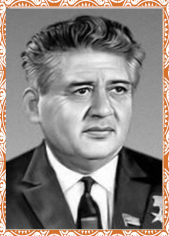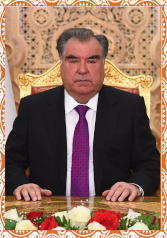Source: https://president.tj/tajikistan/judicial_power
According to the provisions of the Constitution of the Republic of Tajikistan, the structural units of the state, the judiciary and public law enforcement bodies were improved as structural institutions of the state system, and their activities were adapted to the legal documents, including the Constitution of the country.
After the adoption of the Constitution of the Republic of Tajikistan, the judiciary entered a new historical stage as an important pillar of the state power structure and emerged as an institution that administers justice.
Based on this, for the first time in the judicial system of the country, independent judicial institutions were created - the Constitutional Court, economic and military courts.
Serious reforms have taken place in the judicial system of the country. In accordance with the values of a democratic society, the judiciary is recognized as an independent and separate branch of state power, and its activities have been adapted to the requirements of the times and international standards.
After gaining state independence, the Republic of Tajikistan entered a new stage of historical development - building a sovereign, democratic, legal, secular, unitary and social state.
The possibility of further and truly democratic strengthening of the judiciary of Tajikistan was realized after gaining state independence of the Republic of Tajikistan.
On March 10, 1992, by the Decree of the Supreme Council of the Republic of Tajikistan, the laws “On Arbitration Courts of the Republic of Tajikistan” and “On the Procedure for Resolving Economic Disputes by Arbitration Courts of the Republic of Tajikistan” were adopted, which, along with highlighting issues related to tasks, also define the structure and activities of arbitration courts and the procedure for resolving economic disputes.
Along with this, in order to implement judicial justice in the Armed Forces of the Republic of Tajikistan, the Military Collegium of the Supreme Court of the Republic of Tajikistan was established by the Decree of the Presidium of the Majlisi Oli in 1993, and in June 1994 - military garrison courts, which was a significant achievement in the judicial system, because before the adoption of the Constitution only general courts acted in the country.
Thanks to State independence and the adoption of the Constitution of the country, today Tajikistan has an independent judiciary, as a separate pillar of state power, has achieved the development and strengthening of democratic institutions, ensuring the comprehensive protection of man and citizen, his rights and freedoms.
In accordance with the requirements of the legislation, such features of judicial justice are taken into account as independence and impartiality in the consideration of cases by the courts, their subordination only to the Constitution and the law, observance of democratic styles of judicial proceedings, including the equality of the parties of all participants in the trial before the law and the court, based on the discussion of the reception legal proceedings are considered an important guarantor of strengthening the rule of law and justice and the democratic development of the state and society.
In order to improve the country's legal framework, with the adoption of the Constitution, legal reforms were given a new impetus, and with the periodic implementation of these reforms, a number of legal documents were approved aimed at achieving the goals of a democratic and legal state. These include the constitutional laws “On the Election of the President of the Republic of Tajikistan”, “On the Constitutional Court of the Republic of Tajikistan”, “On the Courts of the Republic of Tajikistan”, civil, family, labor, criminal, civil procedure, economic codes and the code of administrative offenses, laws “On Amnesty”, “On the streamlining of traditions, celebrations and rituals”, “On the state language of the Republic of Tajikistan”, “On the responsibility of parents for the upbringing and education of children” and others.
As a result of the strengthening of unity, stability and national accord, amendments and additions were made to the Constitution of the country three times through a popular referendum, through which the judicial and legal system was improved, strengthening the principle of the independence of courts, their material, financial and technical support, selection and training of candidates for the positions of judges and trainee judges, upgrading their qualifications, as well as other employees of the court apparatus.
Based on the constitutional reforms of 1999 and 2003, the system of legislative power was improved, during which the highest representative and legislative body of the country - Majlisi milli and Majlisi namoyandagon - was created, and on the basis of these reforms, the activities of the executive and judicial authorities were improved, and the terms of office of judges were extended by 10 years.
Along with this, the judiciary was presented as an important and necessary pillar of the state power structure, institutions for the implementation of judicial justice were created in terms of organization, quality and quantity, and the Constitutional Court, economic and military courts, as well as the age of qualification for election or appointment as a judge from the age of 60 was brought up to 65.
In order to remove the organizational issues of the judiciary from the jurisdiction of the executive branch, that is, from the jurisdiction of the Ministry of Justice, the Decree of the President of the Republic of Tajikistan dated December 14, 1999 under No. 48 established the Council of Justice of the Republic of Tajikistan and this newly created collegial structure was entrusted with the solution of these issues.
Also, for the regular improvement of the specialty and advanced training of judges, trainee judges and other employees of the judicial apparatus, the Judicial Training Center was established under the Council of Justice.
With a view to improving the functioning of the judicial system, the constitutional reforms that were carried out on May 22, 2016, among other changes and additions to the Constitution, abolished the Council of Justice of the Republic of Tajikistan, and the resolution of important issues related to the organization of the activities of courts, their material and technical support, the preparation of candidates for positions of judges, advanced training of judges and employees of the judiciary, as well as the nomination of candidates for the position of a judge, was entrusted to the Supreme Court and the Higher Economic Court.
The role of the Founder of Peace and National Unity - Leader of the Nation, President of the Republic of Tajikistan, Honorable Emomali Rahmon, is very important in the development and strengthening of the judiciary.
The State and the Government of the country have taken specific measures to strengthen the activities of the judiciary, to increase the role of the court in the performance of its constitutional duties, to enhance and strengthen the judicial structure, to improve the material and legal status of justice bodies and judges, as well as to upgrade legislation. On the basis of the Address of the President of the Republic of Tajikistan to the Majlisi Oli in April 20, 2006 and with the direct support of the Leader of the Nation, the Program of Judicial and Legal Reforms was developed and approved by Decree of the President of the Republic of Tajikistan dated June 23, 2007 No. 271.
One of the most important democratic phenomena, which is reflected in the Constitution of the Republic of Tajikistan, is the idea of separation of power into legislative, executive and judicial, that is, in order for all state authorities to independently exercise their powers without interfering in each other's activities, a legal guarantee is established.
Article 9 of the Constitution recognizes the judiciary as an independent branch of state power, and its chapter 8 (articles 84-92) defines the tasks, goals, principles of activity, requirements for the appointment and selection of judges to the judiciary, and judicial justice is an important factor in ensuring social justice and protection of human and civil rights and freedoms, as well as the interests of the state, organizations and institutions.
According to the provisions of the Constitution, ensuring the security of the nation and the state, safeguarding peace in society, maintaining peace and stability, strengthening independence and protecting its achievements are among the main tasks of the judiciary. The court and the judiciary are the guardians of an independent legal state and ensure the peace, stability and potential of each state.
Laws were adopted regarding the structure and activities of the judiciary, including on August 6, 2001, the Constitutional Law “On the Courts of the Republic of Tajikistan” was adopted which defines the form of organization and activities of the judges of the country, the tasks and powers of judges and the requirements for judges, the procedure for electing and appointments, social and financial status of judges, responsibility and obligation to execute judicial acts, and other related issues. The constitutional principle of the independence of judges was specifically enshrined in the laws, and the administration of justice is determined only by the court.
It should be especially noted that the role of the President of the Republic of Tajikistan, Emomali Rahmon, is considered very important on the path to strengthening the judiciary and the practical implementation of social justice. Since, it was the distinguished President who declared the development of the judiciary one of the main directions of state policy, and on its basis, significant and important work is still being carried out to form the country's judicial system and raise the status of the judiciary in society.
Decree of the President of the Republic of Tajikistan dated April 14, 1997 No. 692 "On some measures to ensure the independence of the judiciary of the Republic of Tajikistan" introduced many innovations in the judicial system of the country. This decree resolved a number of issues, such as defining the tasks of bailiffs, assistant chairmen of courts, the required number of secretaries of the court session, the allocation of funds for the material support of courts, the social status of judges and their families, the repair and re-equipment of court buildings with necessary items and equipment, providing them with vehicles and auxiliary equipment.
Over the past 15 years alone, the number of judges of military courts, regions, the city of Dushanbe, cities and districts, economic courts of regions and the city of Dushanbe has increased from 282 to 443.
It should be recalled that after gaining state independence, on the direct initiatives of the Leader of the Nation, serious attention was paid to issues of equal rights for women. In particular, the Decree of the President of the Republic of Tajikistan dated December 3, 1999 "On measures to enhance the role of women in society" is important in the direction of raising the status of women in the new society.
The Supreme Court has taken effective measures to implement this decree, and today out of 443 working units of the judicial system of the country, there are 374 judges, 79 of which are women, who, as chairs of courts, deputy chairs, chairs of judicial panels and judges, successfully carry out activities and their contribution is significant in ensuring the administration of justice.
Decree of the President of the Republic of Tajikistan dated June 23, 2007 No. 271 “On the Program of Judicial and Legal Reforms in the Republic of Tajikistan” opened a wide path to strengthening the judiciary and fulfilling its duties. The mentioned program, along with the promotion of the development of the activities of the judiciary, provides for the strengthening of law enforcement agencies, which play a direct role in the administration of justice.
To implement the Action Plan for the application of this program, a number of laws were adopted, as well as civil, economic, criminal procedure codes, codes of administrative offenses, laws “On Enforcement Proceedings”, “On Arbitration Courts”, “On Human Rights Ombudsman in the Republic Tajikistan" and others.
At the expense of the reserve fund of the President of the Republic of Tajikistan for the creation of additional working units in the regional courts - the Dushanbe City Court and the Supreme Court, judicial boards for family cases and administrative offenses were formed, which is evidence of the constant concern of the state and the Government to strengthen the structure and develop the judiciary, and that contributes to the quality consideration of cases and the adoption of lawful and valid decisions.
Also, by Decree of the President of the Republic of Tajikistan dated January 3, 2011 No. 976, a new Program of judicial and legal reforms in the Republic of Tajikistan for 2011-2013 was approved.
In connection with this program, the constitutional laws “On the Constitutional Court of the Republic of Tajikistan”, “On the courts of the Republic of Tajikistan”, the Code of Administrative Offenses and the Code of Ethics of Judges of the Republic of Tajikistan were adopted.
For the purpose of developing the judicial system of the country, increase the level of professional knowledge of judges, strengthen the role and place of courts in ensuring the protection of human and civil rights and freedoms, the legitimate interests of the state, organizations and institutions, regardless of their organizational and legal form, by Decree of the President of the Republic of Tajikistan dated 5 January 2015, No. 327, the Judicial and Legal Reform Program for 2015-2017 was approved, which was the third Judicial and Legal Reform Program in the country.
In order to implement this program, more than 100 changes and additions were made to the current legislation of the country, the Labor Code of the Republic of Tajikistan and the Law of the Republic of Tajikistan “On the Bar and Lawyer Activities” were adopted in accordance with international standards. In addition, with a view to supporting persons who do not have the opportunity to receive paid legal assistance to protect their rights and freedoms and who need such assistance, the Decree of the Government of the Republic of Tajikistan dated July 2, 2015 No. 425 approved the Concept for the provision of free legal assistance, according to which at present, free legal assistance is provided to poor people in cities and districts of the country.
By Decree of the President of the Republic of Tajikistan dated April 19, 2019 No. 1242, the fourth Program of Judicial and Legal Reforms in the Republic of Tajikistan for 2019-2021 was approved, and this initiative follows from the Address of the President of the Republic of Tajikistan to Majlisi Oli delivered on December 26, 2018.
This program is a continuation of previously adopted programs and is aimed at further strengthening the judiciary, developing and improving existing legislation, enhancing the material and technical support of courts and judicial staff.
As part of this program, in 2021, the Law “On Access to Information on the Activities of Courts” was adopted for the first time. The purpose of the adoption of this law is to ensure the principle of publicity of judicial proceedings and public access to issues related to the activities of the courts. Also, this law is an important guarantee of a fair trial and a means of strengthening public confidence in the judiciary, regulates the requirements for the content of court websites, the procedure for publishing court documents, forms of interaction between courts and the public, and the media on access to information about the activities of courts.
It is important to note that ensuring the necessary level of material, technical and organizational conditions of the courts, in particular, providing them with modern buildings and equipment, official vehicles, improving the social and living conditions of judges, in particular providing them with housing, and periodically increasing the salaries of judges are one of the main factors strengthening the status of the judiciary in society and preventing offenses of a corrupt nature in the judiciary, and contributes to the implementation of legal acts in the fight against corruption.
Currently, the Government of Tajikistan is implementing many initiatives to ensure the independence of the judiciary, and these measures include an increase in the positions of judges and the number of employees of the judiciary, the annual anticipated increase in the budget of the judiciary, providing courts with modern buildings and equipment, connecting to the Internet, opening information portals for the judiciary and much more.
At the same time, in order to improve the organizational conditions for the work of courts, during the period of independence, the administrative buildings of most courts were reconstructed, almost all buildings of city and district courts were overhauled and furnished with modern equipment. The construction of a new building of the Supreme Court at the expense of the republican budget continues.
During the period of independence, the official salary of judges was increased from 15 to 20 percent, and many judges were provided with housing.
It should be noted that effective and high-quality training of young personnel in the field of the judiciary contributes to the expansion of their worldview, the improvement of their professional skills and the quality of the administration of justice.
In order to prepare candidates for the positions of judges, trainee judges, to increase the knowledge, professional experience of judges and employees of the apparatus of the courts of the country, the Judicial Training Center was established by Decree of the Government of the Republic of Tajikistan dated March 31, 2003 No. 150.
The activity of the Judicial Training Center under the Supreme Court of the Republic of Tajikistan is aimed at implementing programs of judicial and legal reform, including the training of candidates for the positions of judges, trainee judges, advanced training of judges and other employees of the judicial apparatus of the country.
Trainee judges (such an institution was established in the judiciary on March 20, 2008), with the view of improvement of their professional qualifications and fully preparing for the position of a judge, take theoretical and practical classes at the Judicial Training Center under the Supreme Court throughout the year.
The examination of trainee judges is taken by a competent commission, the composition of which is approved by the President of the Republic of Tajikistan, and the best candidates are selected from among the applicants.
Concerning this important issue, the Founder of Peace and National Unity - Leader of the Nation, President of the Republic of Tajikistan, Emomali Rahmon, at a meeting with judges and judicial officials on November 21, 2019, once again emphasized that “judges, along with knowledge and experience, must have a clean conscience, decent manners and good behavior. This method of recruitment will allow in the future to exclude the commission of corrupt acts by employees of the judiciary, to increase the status and influence of the judiciary.”
Numerous meetings of the President of the Republic of Tajikistan, Honorable Emomali Rahmon, with judges and senior officials of the judiciary, instructions and guidance of the Head of State played an important role in improving the activities of judges in making lawful and reasonable decisions.
The analysis shows that the judiciary is successfully coping with its tasks - protecting the rights and freedoms of man and citizen, the interests of the state, organizations and institutions, ensuring the rule of law and justice, and expanding its activities in order to further earn the trust of the country's population.
 Login
Login Sitemap
Sitemap Contacts
Contacts


 Адиб, олим ва асосгузори адабиёти муосири тоҷик. Аввалин Президенти Академияи илмҳои Ҷумҳурии Тоҷикистон. Муаллифи асарҳои «Таърихи амирони манғитияи Бухоро», «Таърихи инқилоби фикрӣ дар Бухоро», «Намунаи адабиёти тоҷик», «Дохунда», «Ғуломон», «Ёддоштҳо» ва дигар асарҳо, ки ба 29 забони хориҷӣ нашр шудаанд.
Адиб, олим ва асосгузори адабиёти муосири тоҷик. Аввалин Президенти Академияи илмҳои Ҷумҳурии Тоҷикистон. Муаллифи асарҳои «Таърихи амирони манғитияи Бухоро», «Таърихи инқилоби фикрӣ дар Бухоро», «Намунаи адабиёти тоҷик», «Дохунда», «Ғуломон», «Ёддоштҳо» ва дигар асарҳо, ки ба 29 забони хориҷӣ нашр шудаанд. Олим, академики Академияи Илмҳои ИҶШС, арбоби ҳизбӣ ва давлатӣ, муаллифи китоби оламшумули «Тоҷикон» ва зиёда аз 300 асару мақолаҳо.
Олим, академики Академияи Илмҳои ИҶШС, арбоби ҳизбӣ ва давлатӣ, муаллифи китоби оламшумули «Тоҷикон» ва зиёда аз 300 асару мақолаҳо. Шоири халқӣ, раиси Иттифоқи нависандагони Тоҷикистон, Қаҳрамони меҳнати сотсиалистӣ, Раиси Кумитаи якдилии халқҳои Осиё ва Африқо. Барои достонҳои «Қиссаи Ҳиндустон»(1948), «Ҳасани аробакаш», «Чароғи абадӣ», «Садои Осиё»,(1960) «Ҷони ширин» (1963) бо ҷоизаҳои давлатии ИҶШС, ҶШС Тоҷикистон ва байналмилалии ба номи Ҷ. Неҳру (1967) сарфароз шуда буд.
Шоири халқӣ, раиси Иттифоқи нависандагони Тоҷикистон, Қаҳрамони меҳнати сотсиалистӣ, Раиси Кумитаи якдилии халқҳои Осиё ва Африқо. Барои достонҳои «Қиссаи Ҳиндустон»(1948), «Ҳасани аробакаш», «Чароғи абадӣ», «Садои Осиё»,(1960) «Ҷони ширин» (1963) бо ҷоизаҳои давлатии ИҶШС, ҶШС Тоҷикистон ва байналмилалии ба номи Ҷ. Неҳру (1967) сарфароз шуда буд. Президенти Ҷумҳурии Тоҷикистон. 19 ноябри соли 1992 дар иҷлосияи XVI Шўрои Олии Ҷумҳурии Тоҷикистон раиси Шўрои Олии Ҷумҳурии Тоҷикистон, 6 ноябри соли 1994 бори аввал, солҳои 1999, 2006 ва 2013 Президенти Ҷумҳурии Тоҷикистон интихоб гардидаст.
Президенти Ҷумҳурии Тоҷикистон. 19 ноябри соли 1992 дар иҷлосияи XVI Шўрои Олии Ҷумҳурии Тоҷикистон раиси Шўрои Олии Ҷумҳурии Тоҷикистон, 6 ноябри соли 1994 бори аввал, солҳои 1999, 2006 ва 2013 Президенти Ҷумҳурии Тоҷикистон интихоб гардидаст. Нусратулло Махсум (Лутфуллоев) ходими давлатӣ ва ҳизбӣ. Солҳои 1924-1926 раиси Кумитаи инқилобии ҶМШС Тоҷикистон, солҳои 1926-1933 раиси Кумитаи Иҷроияи Марказии ҶШС Тоҷикистон.
Нусратулло Махсум (Лутфуллоев) ходими давлатӣ ва ҳизбӣ. Солҳои 1924-1926 раиси Кумитаи инқилобии ҶМШС Тоҷикистон, солҳои 1926-1933 раиси Кумитаи Иҷроияи Марказии ҶШС Тоҷикистон. Ходими давлатӣ ва ҳизбӣ. Солҳои 1929-1931 котиби Ҳизби коммунистии ҶШС Тоҷикистон, солҳои 1933-1937 Раиси Кумитаи Иҷроияи Марказии ҶШС Тоҷикистон.
Ходими давлатӣ ва ҳизбӣ. Солҳои 1929-1931 котиби Ҳизби коммунистии ҶШС Тоҷикистон, солҳои 1933-1937 Раиси Кумитаи Иҷроияи Марказии ҶШС Тоҷикистон.


